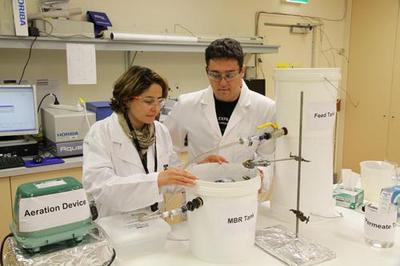DIY wastewater treatment system to benefit Tunisia
A low-cost wastewater treatment system built entirely with recycled materials and parts from hardware shops will help transfer Australian expertise to classrooms in Tunisia.
Engineers from UNSW have teamed up with a visiting research fellow from Tunisia to develop a sustainable, do-it-yourself membrane bioreactor (MBR) - a system used to treat residential and industrial wastewater so the effluent can be safely discharged or reclaimed for irrigation.

“Agriculture is one of the most water-intensive sectors and has led to the over-exploitation of groundwater resources in Tunisia. Consequently, safe re-use of reclaimed water is now a necessity, not just an option,” said Assistant Professor Olfa Khelifi from the University of Tunis El Manar, located in the Tunisian capital.
“In many rural areas we have small agrifood factories whose operations are very water-intensive. If we could introduce a low-cost treatment technology, I think these businesses, and other industries, would be very interested in adapting these systems.”
She says this would also have significant environmental benefits as it could help initiate better oversight of how wastewater is discharged.
Khelifi came to UNSW for one month with the help of a $20,000 grant from the Council for Australian-Arab Relations - an initiative run by the Department of Foreign Affairs and Trade. She has worked with environmental engineer Dr Stuart Khan and chemical engineer Dr Pierre Le-Clech from UNSW to develop the sustainable treatment system.
The UNSW researchers have considerable experience building lab-scale MBRs for research purposes, but these incorporate technical components and cost roughly $20,000. This expense is a major obstacle for reproduction in Tunisia.
Their simplified system, which uses recycled materials and inexpensive parts, comes in around $2500 - approximately one-eighth the cost.
“This is small-scale and will be used primarily as a teaching resource, but it does work,” said Dr Khan, a senior lecturer in the School of Civil and Environmental Engineering. “We wanted an operable system so we could accurately determine how well it was removing organic carbon from the water.”
The objective is to give students the chance to work with a physical system and to teach them how to measure and assess how the system is working, he says. “We’re also putting together a handbook on how to build these small teaching resources.”
The system is the main component of a new wastewater management training course, based on existing Australian materials but adapted for Tunisian students and industry professionals. The researchers hope the course can also benefit other developing countries with water security concerns.
Chemical dosing tech to combat sulfide smell in sewers
Dr Jiuling Li has developed an award-winning, real-time control and chemical dosing technology to...
Using pure oxygen to treat wastewater
Barwon Water's new Green Oxygen for Wastewater Treatment project has secured up to $3 million...
Geraldton prepares for population surge with $7.5m wastewater upgrade
In coming years, an additional 5500 people are expected to settle in Glenfield Beach, WA,...







